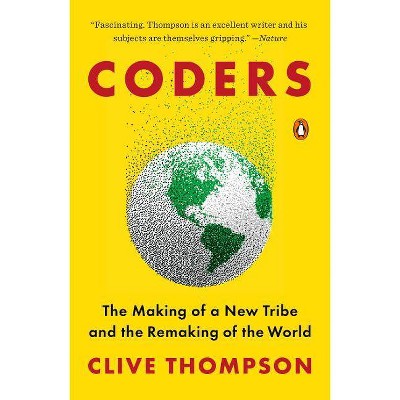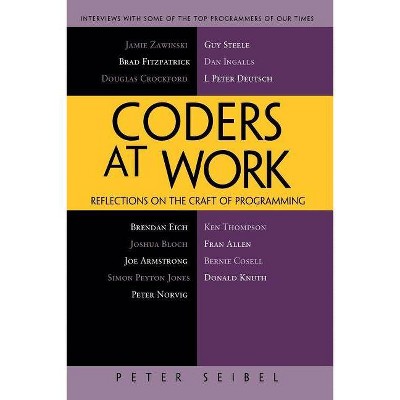Coders - by Clive Thompson (Paperback)

Similar Products
Products of same category from the store
AllProduct info
<p/><br></br><p><b> About the Book </b></p></br></br>"[An] anthropological reckoning with the most powerful tribe in the world today, computer programmers--where they come from, how they think, what makes for greatness in their world, and what should give us pause"--<p/><br></br><p><b> Book Synopsis </b></p></br></br>Facebook's algorithms shaping the news. Self-driving cars roaming the streets. Revolution on Twitter and romance on Tinder. We live in a world constructed of code--and coders are the ones who built it for us. Programmers shape our everyday behavior: When they make something easy to do, we do more of it. When they make it hard or impossible, we do less of it. From acclaimed tech writer Clive Thompson comes a brilliant anthropological reckoning with the most powerful tribe in the world today, computer programmers, in a book that interrogates who they are, how they think, what qualifies as greatness in their world, and what should give us pause. <p/>In pop culture and media, the people who create the code that rules our world are regularly portrayed in hackneyed, simplified terms, as ciphers in hoodies. Thompson goes far deeper, taking us close to some of the great programmers of our time, including the creators of Facebook's News Feed, Instagram, Google's cutting-edge AI, and more. Speaking to everyone from revered 10X elites to neophytes, back-end engineers and front-end designers, Thompson explores the distinctive psychology of this vocation--which combines a love of logic, an obsession with efficiency, the joy of puzzle-solving, and a superhuman tolerance for mind-bending frustration. <p/>Along the way, <i>Coders</i> ponders the morality and politics of code, including its implications for civic life and the economy and the major controversies of our era. In accessible, erudite prose, Thompson unpacks the surprising history of the field, beginning with the first coders -- brilliant and pioneering women, who, despite crafting some of the earliest personal computers and programming languages, were later written out of history. At the same time, the book deftly illustrates how programming has become a marvelous new art form--a source of delight and creativity, not merely danger. To get as close to his subject as possible, Thompson picks up the thread of his own long-abandoned coding skills as he reckons, in his signature, highly personal style, with what superb programming looks like. <p/>To understand the world today, we need to understand code and its consequences. With <i>Coders, </i> Thompson gives a definitive look into the heart of the machine.<p/><br></br><p><b> Review Quotes </b></p></br></br><br>"Fascinating. Thompson is an excellent writer and his subjects are themselves gripping. . . . [W]hat Thompson does differently is to get really close to the people he writes about: it's the narrative equivalent of Technicolor, 3D and the microscope. . . . People who interact with coders routinely, as colleagues, friends or family, could benefit tremendously from these insights." --<b><i>Nature</i></b> <p/> "With an anthropologist's eye, [Thompson] outlines [coders'] different personality traits, their history and cultural touchstones. He explores how they live, what motivates them and what they fight about. By breaking down what the actual world of coding looks like . . . he removes the mystery and brings it into the legible world for the rest of us to debate. Human beings and their foibles are the reason the internet is how it is--for better and often, as this book shows, for worse." --<b><i>The</i> <i>New York Times Book Review</i></b> <p/>"An outstanding author and long-form journalist. . . . I particularly enjoyed [Thompson's] section on automation." --<b>Tim Ferriss</b> <p/>"The best survey to date of this world and its people . . . An avalanche of profiles, stories, quips, and anecdotes in this beautifully reported book returns us constantly to people, their stories, their hopes and thrills and disappointments. . . . Fun to read, this book knows its stuff." <b><i>--The Philadelphia Inquirer</i></b> <p/>"[An] enjoyable primer on the world of computer programmers. . . . Coders are building the infrastructure on which twenty-first century society rests, and their work has every chance of surviving as long, and being as important, as the Brooklyn Bridge--or, for that matter, the Constitution." --<b><i>Bookforum</i></b> <p/>"Thompson delivers again with this well-written narrative on coders, individual histories, and the culture of coder life, at home and work. . . . In addition to analyzing the work-life of coders, he brilliantly reveals several examples of how they live in their respective relationships. Throughout, Thompson also does a great job exploring the various drivers that permeate the industry: merit, openness of code, long coding stints without sleep, and how the culture tends toward start-up culture even when companies are established. This engaging work will appeal to readers who wish to learn more about the intersection of technology and culture, and the space in which they blur together." --<b><i>Library Journal</i>, starred review</b> <p/>"Thompson offers a broad cultural view of the world of coders and programmers from the field's origins in the mid-twentieth century to the present. In this highly readable and entertaining narrative, he notes the sense of scale and logical efficiency in coding and the enthusiasm with which programmers go about creating new features and finding bugs. . . . [A] comprehensive look at the people behind the digital systems now essential to everyday life."--<b><i>Booklist</i></b> <p/>"Looks at some of the stalwarts and heroes of the coding world, many of them not well-known. . . . Thompson is an enthusiast and a learned scholar alike. . . . Fans of Markoff, Levy, Lanier, et al. will want to have a look at this intriguing portrait of coding and coders." --<b><i>Kirkus</i> <p/>"</b>In this revealing exploration of programming, programmers, and their far-reaching influence, <i>Wired</i> columnist Thompson opens up an insular world and explores its design philosophy's consequences, some of them unintended. Through interviews and anecdotes, Thompson expertly plumbs the temperament and motivations of programmers. . . . [<i>Coders</i>] contains possibly the best argument yet for how social media maneuvers users into more extreme political positions. . . . Impressive in its clarity and thoroughness, Thompson's survey shines a much-needed light on a group of people who have exerted a powerful effect on almost every aspect of the modern world."<b> --<b><i>Publishers Weekly</i>, starred review</b><br></b><br>As a person who has spent a lot of time writing code, I can confirm that you need to be a little bit of a weirdo to love it. Clive Thompson's book is an essential field guide to the eccentric breed of architects who are building the algorithms that shape our future, and the AIs who will eventually rise up and enslave us. Good luck, humans!" <b>--Jonathan Coulton, musician</b> <p/> "Clive Thompson is more than a gifted reporter and writer. He is a brilliant social anthropologist. And, in this masterful book, he illuminates both the fascinating coders and the bewildering technological forces that are transforming the world in which we live." <b>--David Grann, author of <i>The Lost City of Z</i> and <i>Killers of the Flower Moon</i></b><br> <i> </i><br> "With his trademark clarity and insight, Clive Thompson gives us an unparalleled vista into the mind-set and culture of programmers, the often-invisible architects and legislators of the digital age." <b>--Steven Johnson, author of <i>How We Got to Now</i> </b> <p/> "If you have to work with programmers, it's essential to understand that programming has a culture. This book will help you understand what programmers do, how they do it, and why. It decodes the culture of code." <b>--Kevin Kelly, senior maverick for <i>Wired</i> </b> <p/> "Clive Thompson is the ideal guide to who coders are, what they do, and how they wound up taking over the world. For a book this important, inspiring, and scary, it's sinfully fun to read." <b>--Steven Levy, author of <i>In the Plex</i></b> <p/> "It's a delight to follow Clive Thompson's roving, rollicking mind anywhere. When that 'anywhere' is the realm of the programmers, the pleasure takes on extra ballast. <i>Coders</i> is an engrossing, deeply clued-in ethnography, and it's also a book about power, a new kind: where it comes from, how it feels to wield it, who gets to try--and how all that is changing." <b>--Robin Sloan, author of <i>Mr. Penumbra's 24-Hour Bookstore</i></b> <p/> "Clive Thompson has deftly picked apart the myth of a tech meritocracy. Guiding readers through the undercovered history of programming's female roots, <i>Coders</i> points with assurance to the inequities that have come to define coding today, as both a profession and the basis of the technology that shapes our lives. Readable, revealing, and in many ways infuriating." <b>--Rebecca Traister, author of <i>Good and Mad</i></b> <p/> "Code shapes coders, and coders shape the code that changes how we think, every day of our lives. If you want to create a more humanistic digital world, read this book to get started." <b>--Sherry Turkle, professor at MIT; author of <i>Reclaiming Conversation</i> and <i>Alone Together</i></b> <p/> "Thompson has accomplished the nearly impossible task of portraying the coding world exactly as it is: messy, inspiring, naive, and--at times--shameful. <i>Coders</i> is a beautifully written and refreshingly fair portrayal of a young industry that's accomplished so much and still has a lot to learn." <b>--Saron Yitbarek, CEO and founder of CodeNewbie</b><br><p/><br></br><p><b> About the Author </b></p></br></br>Clive Thompson is a longtime contributing writer for the <i>New York Times Magazine</i> and a columnist for <i>Wired.</i> He is the author of <i>Smarter Than You Think: How Technology is Changing Our Minds for the Better.</i>
Price History
Price Archive shows prices from various stores, lets you see history and find the cheapest. There is no actual sale on the website. For all support, inquiry and suggestion messagescommunication@pricearchive.us




















